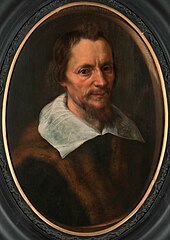Friedrich Lindenbrog
Friedrich Lindenbrog , also Lindenbruch or Latin Tiliobroga , (born December 28, 1573 in Hamburg , † September 9, 1648 there ) was a German philologist and manuscript collector .
Live and act
Friedrich Lindenbrog was a son of the Hamburg notary and Danish historical researcher Erpold Lindenbrog (1540-1616). He had a brother named Heinrich who died early. The other brother Heinrich (1570–1642) later became a philologist and librarian.
The schooling of the Lindenbrog brothers is not documented. In the spring of 1592 they enrolled in the register of the University of Helmstedt . They continued their studies with Justus Lipsius and Joseph Justus Scaliger at the University of Leiden . Above all Joseph Justus Scaliger had a significant influence on the career of the brothers. He referred Friedrich Lindenbrog to circles of scholars in Paris . As Scaliger's letters and some manuscripts from Lindenbrog's estate show, he stayed in contact with his two university professors even after his studies.
After studying in Leiden, the Lindenbrog brothers went their separate ways. The royal chancellor Soffrey de Calignon (1550–1606) appointed Friedrich in 1599 as a preceptor in Paris. Here he continued his work on editions of Statius's writings. He finished Plantin in 1600 and Terence in 1602 . In the French capital, Lindenbrog met important philologists and legal scholars, who exchanged ideas in particular on the Lex Salica . Knowing François and Pierre Pithou , Lindenbrog was able to take part in these discussions. He bought numerous manuscripts, which included important legal sources, of which he made copies himself or commissioned them. During this time he obtained 35 important manuscripts from the St. Victor monastery in ways that are still unknown today . Later biographers suspected that Lindenbrog had stolen them and only escaped punishment because of important patrons.
During his time in Paris, Lindenbrog traveled repeatedly. In 1604 he lived in Switzerland , mostly in Basel , then twice in Florence . In the library of the local monastery he worked out the basis for an edition of Ammianus Marcellinus , which he completed in Hamburg in 1609. Lindenbrog acquired valuable manuscripts here, which he sent to Hamburg. From there they found their way into Johann Adolf's library at Gottorf Castle , whose library was looked after by his brother Heinrich. Therefore, many writings from Paris and Florence reached the Gottorf library. Copies of it got to Hamburg or were given away.
In 1608 Lindenbrog took his law degree from his promoter Johann Gut (1555–1629) in Basel . He then worked as a lawyer in Hamburg. In 1613 he published what is probably the first annotated version of the Germanic People's Rights , which is an important source for research into legal history. The Hamburg Senate sent him to London in 1614 to negotiate matters relating to Merchant Adventurers . There he devoted himself mostly to his own interests and bought many books or commissioned copies of manuscripts in London and Oxford libraries.
Back in Hamburg he received his doctorate in both rights in 1624. A year later he married Margarethe Moller, whose first husband Sebastian von Bergen had died in 1623. Since von Bergens' will was invalid, his heirs and von Lindenbrog fought for several years. The former mayor of Hamburg had ordered his valuable library to be sold in favor of the heirs, which Margaretha Moller had prevented. The library remained in the possession of the Lindenbrog couple and later went to the Hamburg City Library . The legal disputes only ended with a settlement after Lindenbrog's death.
In 1645 Lindenbrog wrote his will. In it he bequeathed the books of his father and brothers to the city library. In addition, there were his own holdings and those of von Bergens. His estate administrator noted that a catalog of Lindenbrog's library existed, but is now unknown.
In the 18th century, Lindenbrog's manuscripts and prints were systematically cataloged and thereby scattered. A large part of the plants was outsourced during the Second World War . Since the holdings were only brought back in 1990, the Friedrich Lindenbrogs legacy could not be adequately reconstructed. The Hamburg library still measures around 3,000 manuscripts, several of which are undoubtedly from the Lindenbrogs collection.
literature
- Friedhelm Neef: Lindenbrog, Friedrich. In: New German Biography (NDB). Volume 2, Duncker & Humblot, Berlin 1955, ISBN 3-428-00183-4 , p. 596 f. ( Digitized version ).
- Karl Felix Halm: Lindenbrog, Friedrich . In: Allgemeine Deutsche Biographie (ADB). Volume 18, Duncker & Humblot, Leipzig 1883, p. 692 f (correction in ADB 20).
- Lindenbruch, Friedrich . In: Franklin Kopitzsch, Dirk Brietzke (Hrsg.): Hamburgische Biographie . tape 233 . Wallstein, Göttingen, p. 234 Eva Horváth .
Web links
- Works by and about Friedrich Lindenbrog in the German Digital Library
- Publications by and about Friedrich Lindenbrog in VD 17 .
| personal data | |
|---|---|
| SURNAME | Lindenbrog, Friedrich |
| ALTERNATIVE NAMES | Lindenbruch, Friedrich; Tiliobroga, Friedrich |
| BRIEF DESCRIPTION | German philologist and manuscript collector |
| DATE OF BIRTH | December 28, 1573 |
| PLACE OF BIRTH | Hamburg |
| DATE OF DEATH | September 9, 1648 |
| Place of death | Hamburg |
